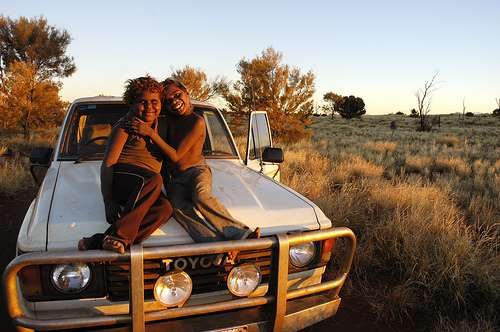Mateship key to boosting resilient youth

Having a supportive friend who is connected to their family and greater community can be the critical factor that protects and promotes resilience in vulnerable Aboriginal youth, according to research from the Telethon Kids Institute.
The study, led by PhD candidate Katrina Hopkins, is the first to explore differences in the factors that protect and promote psychosocial functioning in Australian Aboriginal youth from high-risk and low-risk family environments.
"Intuitively, it didn't make sense that the needs of youth who are engaged at school and have supportive families would be the same as for more vulnerable youth in families and communities with low resources," she says.
"I focussed on mental health outcomes because of the high suicide rates amongst Aboriginal youth, and strong associations between poor mental health and suicide."
The researchers analysed 1021 young people aged 12–17 years from data collected in the Western Australian Aboriginal Child Health Survey.
The questionnaire is a population-based survey investigating cultural and social determinants that impact the health and wellbeing of Aboriginal youth, their families and communities.
Individual, peer, family, community and cultural factors were identified, including self-esteem and self-regulation, prosocial friendships, racism, parenting, household employment, family violence, neighbourhood socioeconomic status and cultural knowledge.
Resilient youth identified
They found that 58.4 per cent of youth living in high-risk family contexts—sole parent, unemployment, harsh or low nurturing parenting, and exposure to violence—were identified as resilient.
"Two factors were protective for these youth from high-risk families; having a prosocial friend, and living in lower socioeconomic ranked neighbourhoods," Ms Hopkins says.
"Whereas youth with no prosocial friends were more than twice as likely to have poor psychosocial functioning.
"These findings indicate the importance of supportive, social relationships, especially when young people are in families without the necessary human and financial resources to provide them the support they need.
"For low-risk exposed youth, having a prosocial friend was not significant...whereas reported exposure to racism [for this group] was significantly associated with poor mental health."
Ms Hopkins says that for all youth having higher self-esteem and self-regulation, like not getting into fights, were related to having good mental health.
She says the school-based Bush Rangers WA program has unrealised potential in engaging vulnerable Aboriginal youth in school and in conservation activities which resonate with their cultural responsibilities.
She says further research is needed to investigate the impact of racism on mental health and psychosocial resilience on physical health.
More information: Hopkins KD, Zubrick SR, Taylor CL (2014) "Resilience amongst Australian Aboriginal Youth: An Ecological Analysis of Factors Associated with Psychosocial Functioning in High and Low Family Risk Contexts." PLoS ONE 9(7): e102820. DOI: 10.1371/journal.pone.0102820













